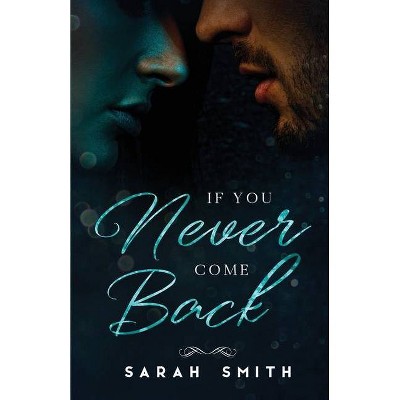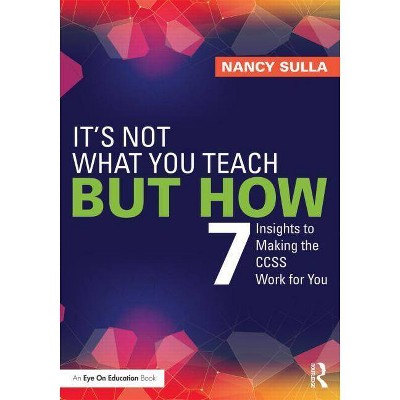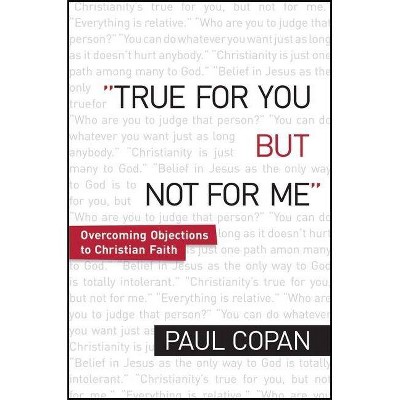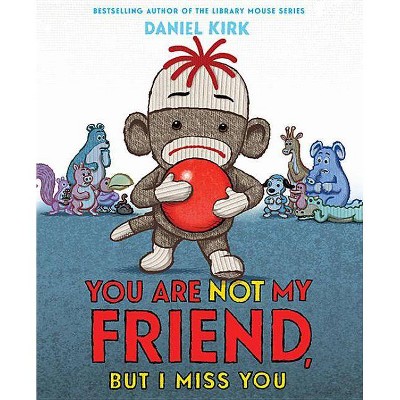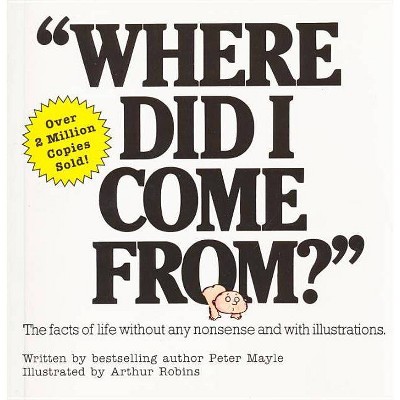But You Did Not Come Back - by Marceline Loridan-Ivens (Paperback)
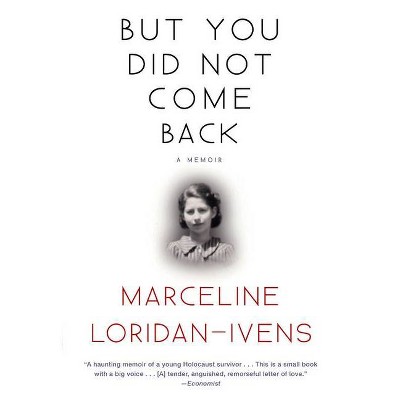
Similar Products
Products of same category from the store
AllProduct info
<p/><br></br><p><b> Book Synopsis </b></p></br></br><b>"You might come back, because you're young, but I will not come back."--Marceline Loridan-Ivens' father, speaking to her at the Drancy internment camp, April 1944</b> <p/>A runaway international bestseller, <i>But You Did Not Come Back</i> garnered rave reviews and features on hardcover publication, including a <i>New York Times</i> profile on the author. Hailed as an important new addition to the library of books dealing with the Holocaust, it is the profoundly moving and poetic memoir by Marceline Loridan-Ivens, who at the age of fifteen was arrested by the Vichy government's militia, along with her father. At the internment camp of Drancy, France, her father told her that he would not come back, preparing her for the worst. On their arrival at the camps, they were separated--her father sent to Auschwitz, she to the neighboring camp of Birkenau. The three kilometers that separated them were an insurmountable distance, and yet before he died in the camps, he managed to send her a small note, a sign of life that gave Marceline hope to go on. <p/>In <i>But You Did Not Come Back</i>, Marceline writes back to her father. The book is a letter to the man she would never know as an adult, to the person whose death overshadowed her whole life. Although her grief never diminished in its intensity, Marceline ultimately found a calling, working on behalf of many disenfranchised groups, both as an activist for Algerian independence and a documentary filmmaker. <p/>And now, as France and Europe face growing anti-Semitism, Marceline feels pessimistic about the future. Her testimony is a memorial, a confrontation, and a deeply affecting personal story of a woman whose life was shattered and never totally rebuilt.<p/><br></br><p><b> Review Quotes </b></p></br></br><br><b>Praise for <i>But You Did Not Come Back</i>: </b> <p/> <b>Named a Book of the Year by the <i>Economist</i></b><br> <b>Winner of the National Jewish Book Award (Biography, Autobiography and Memoir)</b><br> <b>Named a Memoir of the Year by the <i>Times</i> (UK)</b> <p/> "A profoundly moving testimony of the challenges of survival, a wake-up call to those who ignore the rise of anti-Semitism in Europe, and a stunning tribute to her late father, <i>But You Did Not Come Back</i> is heartbreaking, important, and unlike anything that has preceded it."<b>--André Aciman</b> <p/>"I read this book in one sitting, it was unputdownable, an astonishing account of a family caught up in the Holocaust's turbulent wake, so deeply sad and very, very moving. Most striking to me was the brutal honesty and clarity of her relationship with her father who, despite his murder by the Nazis, is still very much with her more than fifty years later, and the question, so troubling, as to whether it would have been better if he had come back instead of her."<b>--Thomas Harding, author of <i>Hanns and Rudolf</i></b> <p/> "In tight, unsparing prose, [Loridan-Ivens] confronts the delusions her father held, and the lies she told herself. A small book with a big voice."<b>--<i>Economist</i> (Books of the Year 2016)</b> <p/> "Profound and moving . . . elegantly rendered into English by Sandra Smith . . . [This] slim but powerful book is both a vital account of her survival and a tender reply to her father . . . Seldom do such short books make so big an impact . . . Her important and miraculous testimony will endure."<b>--<i>Minneapolis Star Tribune</i></b> <p/>"Extraordinary, unflinching and deeply moving . . . [Loridan-Ivens] describes her experiences with a resolute commitment to detail; there is the brutal, visceral truth . . . and there are harrowing stories . . . But there is no room for sentimentality in Loridan-Ivens's honest and self-aware prose: the facts of her incarceration speak emotively enough . . . Very occasionally a book comes along that demands to be published, to be read, to be talked about. A book about pain and suffering, about cruelty and humanity, about grief and love. <i>But You Did Not Come Back</i> is an exquisitely written, beautifully translated and unwaveringly honest testimony; a story we will all do well never to forget."<b>--<i>Guardian</i></b> <p/>"In this powerful book [Marceline Loridan-Ivens] tells of her harrowing experiences in the extermination camp, of her intense desire to go on living and how to bear the pain of surviving when her father did not."<b>--<i>Daily Express</i> (Best Memoirs of the Season)</b> <p/> "In simple language, without frills or excessive descriptions, [Loridan-Ivens] brings the atrocities of the Holocaust to light as lived by a teenage girl."<b>--<i>Key Peninsula News</i></b> <p/> "Loridan-Ivens brings the clarity of an adolescent's lucid memory to her writing--subtly translated by Sandra Smith . . . woven into her story is such a lucid, life-giving spirit infusing the tales of heroism she casually tells, as well as the guilty secrets she discloses, that this reader, for one, wants to thank this courageous, honest woman for her transformative story."<b>--<i>Jewish Chronicle</i></b> <p/>"Who is a survivor? What does a survivor remember? How does a survivor continue to struggle throughout his or her life? Marceline Loridan-Ivens powerfully and honestly answers these questions in her short but graphic volume of painful remembrance . . . Marceline presents her struggle to survive in personal, forthright, and raw prose . . . An important and piercing first-hand testimony."<b>--<i>Jewish Book Council</i></b> <p/>"A brief, unforgettable memoir."<b>--<i>Jewish Week</i></b> <p/>"Loridan-Ivens' memoir is an instructive presentation of camp experience and its aftermath . . . <i>But You Did Not Come Back</i> . . . pushes our understanding of the war and its aftermath into new territory."<b>--<i>Canadian Jewish News</i></b> <p/> "[A] devastating memoir. [Loridan-Ivens] refuses all pity in this slim but intense testimony . . . Her great achievement is to articulate the astonishing camaraderie and love among the incarcerated, and later the attritional shadow of war, as her family, and she herself, fractures, yet keeps surviving. Profound."<b>--<i>Times</i> (UK) (Memoirs of the Year)</b> <p/> "Despite its gruesome subject matter, the book has moments of bleak humour and its affirmation of human tenderness instils a kind of joy in the reader . . . In just 100 pages, Loridan-Ivens goes to the heart of father-daughter relations; the result is a masterpiece of restraint and luminous precision . . . Exquisitely translated by Sandra Smith, <i>But You Did Not Come Back</i> is a human chronicle of rare power."<b>--<i>Financial Times</i></b> <p/>"[A] searing, profoundly moving memoir . . . Smoothly translated by Sandra Smith . . . <i>But You Did Not Come Back</i> is a beautiful testimony to filial love that sounds a powerful, dire alarm. It is also a reminder that forgetting atrocity isn't an option."<b>--<i>Christian Science Monitor</i></b> <p/>"Loridan-Ivens writes in a plain, conversational style . . . that flows as memory does, observation and recollection in balance. It can be read at a sitting; and then asks to be read again. For even at this distance, when we think we know what happened, and what history tells us, the truth, as seen through Marceline's clear-eyed gaze, astonishes and horrifies . . . There is kindness, too, and courage in this book: not least the author's courage in choosing to live."<b>--<i>New Statesman</i></b> <p/>"[A] deeply moving account . . . The death camps are evoked in their full horror . . . This is a haunting and beautiful book, valuable not only for the first-hand experience of the worst atrocity in living history, but also for its illustration of the long-term effects of trauma, the persistence of anti-Semitism and the enduring power of love."<b>--<i>Independent</i> (UK)</b> <p/>"The year has barely started but already one of the most beautiful books of the year has been published. Short, dense, powerful, in a word: overwhelming, with a simplicity of expression and a skill for creating an image. . . . you will read it in one sitting."<b>--<i>Le Parisien</i></b> <p/>"In this tormented time, this troubled period where the extreme right is showing its teeth all over Europe, Marceline Loridan-Ivens gives us a valuable lesson. . . . You read this with tears welling up in your eyes. . . . I'll say it again: read it. . . . [An] important book, [one] book you'll never forget."<b>--<i>Challenges Magazine</i></b> <p/>"A final, poignant address . . . In the pages of this book . . . words are spoken which have not been spoken before."<b>--<i>Le Monde des Livres</i></b> <p/>"In literature, every so often, there comes a miracle, a book, a text, an author, a writing style, a way of recounting something, refusing any pathos and any exposition, that says things about life and death. I'm evoking <i>But You Did Not Come Back</i>. . . . [A] brief and marvelous opus."<b>--<i>Le Magazine Littéraire</i></b> <p/>"Her testimony is of an extraordinary force . . . The reasons for the wonderful success of this book in France are many. The book owes its reception in the first instance to the quality of the story. Marceline Loridan-Ivens, in spite of the darkness of the events described, avoids any kind of pathos. In radio and television interviews after publication, she has shown an extraordinary pugnacity . . . Now more than ever, it is necessary that we listen to the testimony of this survivor."<b>--<i>Le Figaro</i></b> <p/>"Film-maker, writer, activist, Marceline Loridan-Ivens was deported at the age of 15, together with the father. She survived, but he did not. Seventy years after the liberation of Auschwitz, she takes up a dialogue with him, in <i>But You Did Not Come Back</i> . . . You can still very clearly see a little girl in the rebellious, cheerful, and slightly cloaked face of this petite woman of eighty-six."<b>--<i>Elle</i> (France)</b> <p/>"A precious story, seventy years after the liberation of Auschwitz. . . . [Loridan-Ivens] is speaking about the France of today, the country where [in January, after the Charlie Hebdo attacks] four people were killed in a grocery store because they were Jews. Her testimony is perhaps one of the last, and more than ever it deserves to be read and heard."<b>--<i>Les Inrockuptibles</i></b> <p/>"The words of Marceline Loridan-Ivens . . . have an exceptional force. You have to read these words surrounded by a reverence which is appropriate, but in fact from the very first line, a silence descends, and nothing matters until you have read the last line, and no one could forget those words. You might think that after Primo Levi, Robert Antelme, Claude Lanzmann, there was nothing left to say. But Marceline Loridan-Ivens proves the opposite. Her book gets its force from her anger and her pain, which are still completely intact, even amplified by this 'time that doesn't pass.'"<b>--<i>Le Journal du Dimanche</i></b> <p/>"A dry, tough, violent book . . . The era of the first-hand witnesses of victims of this genocide is drawing to a close and this testimony, which is absolutely singular, will stun and chill the reader."<b>--<i>Le Banquet des Mots</i></b> <p/>"This book shook France, and it will shake Germany too . . . A declaration of love to the father she lost in the camps that will leave no-one unmoved. Above all, <i>But You Did Not Come Back</i> is the testimony of a relentless fighter, describing in hard-to-bear detail her survival of the barbed wire, the railway platforms, the crematoriums, and also what came after that: the life as someone who survived. The arc that Marceline Loridan-Ivens traces in her book reaches from the early postwar period to the Paris of 1968 to post-Charlie-Hebdo France . . . That her return from Auschwitz did not bring her peace is the dark core of her account."<b>--<i>Frankfurter Allgemeine Zeitung</i> (Germany)</b> <p/>"Marceline Loridan-Ivens has lived with harrowing memories of Auschwitz for seven decades. And she insists that the fight against anti-Semitism is far from over . . . [A] poignant memoir."<b>--<i>Sunday Times</i> (UK)</b> <p/>"Simultaneously cynical and ardent . . . hypnotic."<b>--<i>Globe and Mail</i></b> <p/>"Is there anything else to say about the Holocaust that hasn't already been said? The disturbing answer is yes . . . [A] stark, brief memoir (in a beautiful translation by Sandra Smith) . . . An incredible indictment of France's complicity with the Nazis . . . <i>But You Did Not Come Back</i> is as disturbing an account of what it was like to return from the extermination camps as anything I have read."<b>--CounterPunch</b> <p/>"In contrast to similar extermination-camp memoirs, which necessarily relate familiar instances of Nazi brutality and the same strokes of pure luck that kept a few prisoners form the gas chambers, <i>But You Did Note Come Back</i> focuses on the affliction of women. The effects of suffering and depravation were devastating and sometimes permanent . . . It's also tragically true that anti-Semitism and religious conflict, as she points out, once again represent major threats to contemporary France. The book ends with a question as harrowing as it is fundamental."<b>--Arts Fuse</b><br><p/><br></br><p><b> About the Author </b></p></br></br><b>Marceline Loridan-Ivens</b> was born in 1928. She has worked as an actress, a screenwriter, and a director. She directed <i>The Birch-Tree Meadow</i> in 2003, starring Anouk Aimée, as well as several documentaries with Joris Ivens. <p/><b>Sandra Smith</b> is the translator of <i>Suite Française</i> and eleven other novels by Irène Némirovsky, as well as a new translation of Camus's <i>L'Etranger</i>. She has been awarded the French-American Florence Gould Foundation Translation Prize and the PEN Translation Prize. She lives in New York.
Price History
Price Archive shows prices from various stores, lets you see history and find the cheapest. There is no actual sale on the website. For all support, inquiry and suggestion messagescommunication@pricearchive.us
